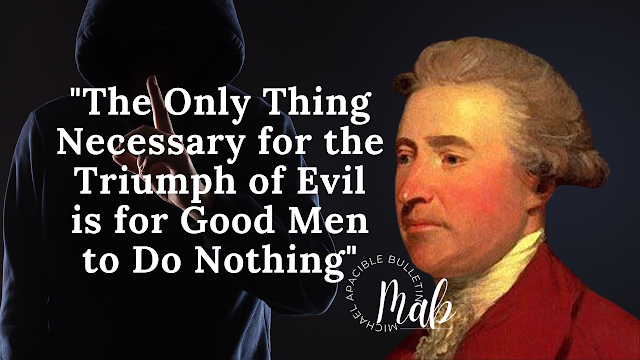The Triumph of Evil and the Power of Goodness: A Call to Action
The Meaning of "The Only Thing Necessary for the Triumph of Evil is for Good Men to Do Nothing" - Edmund Burke
Edmund Burke, an Irish statesman and philosopher, is often credited with the quote, "The only thing necessary for the triumph of evil is for good men to do nothing." This powerful statement encapsulates the idea that inaction or indifference by those who possess the power to stand against evil can ultimately lead to its victory.
At first glance, this quote may seem simple, but it carries profound implications for individuals, societies, and even the course of history. Let's delve deeper into the meaning behind these words and explore their relevance in our modern world.
The Importance of Good Men
When Burke refers to "good men," he is not exclusively referring to men in the literal sense. Instead, he is using the term to represent individuals who possess moral integrity, compassion, and a sense of justice. These are the people who have the ability to recognize and confront evil.
Good men can be found in all walks of life, regardless of gender, race, or social status. They are the ones who refuse to turn a blind eye to injustice and are willing to take a stand for what is right, even when it may be difficult or unpopular.
The Triumph of Evil
The phrase "the triumph of evil" refers to the success or victory of immoral or malevolent forces in the world. Evil can take many forms, ranging from individual acts of cruelty to systemic injustice and oppression. It thrives when good people fail to take action against it.
Evil often relies on the silence, apathy, or inaction of those who could potentially oppose it. When people with the power to make a difference choose to do nothing, evil is allowed to spread and gain strength. This quote serves as a reminder that evil cannot be defeated solely by the absence of wrongdoing; it requires active resistance and a commitment to justice.
The Power of Inaction
Burke's quote highlights the dangerous consequences of inaction. When good men choose to remain silent or passive in the face of evil, they inadvertently contribute to its growth and influence. By doing nothing, they allow evil to flourish unchecked.
One could argue that indifference or inaction is just as harmful as actively engaging in wrongdoing. When good people fail to speak out against injustice or refuse to intervene when they have the power to do so, they become complicit in the perpetuation of evil.
It is important to recognize that the power of inaction extends beyond individuals. Societies and institutions can also fall victim to this trap. When governments, organizations, or communities turn a blind eye to corruption, discrimination, or human rights abuses, they become enablers of evil.
The Call to Action
While Burke's quote serves as a cautionary tale, it also serves as a call to action. It reminds us of our responsibility as individuals to stand up against injustice and actively work towards a better world.
Each person has the power to make a difference, no matter how small their actions may seem. By speaking out against wrongdoing, supporting causes that promote justice, and actively engaging in acts of kindness and compassion, we can collectively combat evil.
Furthermore, this quote emphasizes the importance of solidarity and collaboration. When good men join forces and work together, their collective efforts become even more powerful. By uniting against evil, we can create lasting change and prevent its triumph.
The Relevance Today
Although Edmund Burke spoke these words centuries ago, they continue to resonate today. In a world plagued by numerous challenges, such as inequality, discrimination, and environmental degradation, the quote serves as a reminder of the importance of individual and collective action.
Today, we face new forms of evil that require our attention and response. Whether it's standing up against systemic racism, fighting for gender equality, or advocating for environmental sustainability, the quote encourages us to take a stand and not let evil prevail.
Ultimately, "The only thing necessary for the triumph of evil is for good men to do nothing" reminds us that our actions, or lack thereof, have the power to shape the world we live in. It prompts us to reflect on our own choices and encourages us to be active participants in the fight against injustice and wrongdoing.
Let us heed the wisdom of Edmund Burke's words and strive to be the "good men" who refuse to let evil triumph.



Comments
Post a Comment